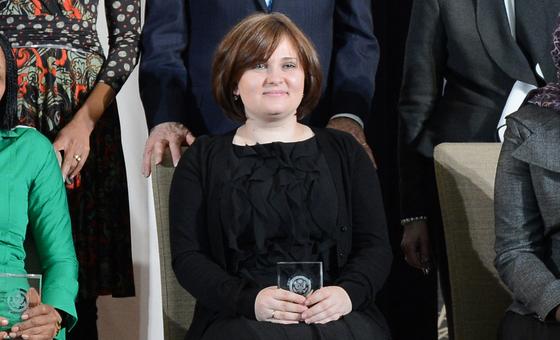Yelena Milashina, who works for the independent investigative news service Novaya Gazeta, was travelling with Alexander Nemov when they were attacked on Monday morning on their way to covering the trial of Zarema Musaeva, the mother of exiled opposition activists who challenged the leader of the Chechen Republic, Ramzan Kadyrov.
The experts urged Russia to fully investigate the incident and bring the perpetrators to justice. According to news reports, Russian authorities have opened a criminal case into the attack.
Blatant disregard for safety
The UN Human Rights Council-appointed Special Rapporteurs described the brutal assault by a group of masked assailants, as “another example of the blatant disregard for the safety of journalists and human rights defenders in the Russian Federation.”
The pair were assaulted and badly beaten shortly after arriving in the Russian Republic of Chechnya on Tuesday.
President Kadyrov stated on social media in January 2022 that the family of Ms. Musaeva “was waiting for a place either in prison or in the ground”.
Alexander Nemov is part of the team of lawyers defending her. Due to the attack, he was unable to attend court for the hearing.
Ms. Milashina is a journalist who has reported for years on Chechnya, investigating human rights abuses in the region, said the experts in a press release issued by the UN human rights office (OHCHR).
‘Terrorist’ accusation
Because of death threats from the Chechen leader, she had to temporarily flee Russia in February 2022 after Mr. Kadyrov publicly called her “a terrorist”, saying “we have always eliminated terrorists and their accomplices”.
The experts pointed out that Ms. Milashina’s investigative reporting followed in the footsteps of two other women journalists, Novaya Gazeta colleague Anna Politkovskaya and Chechen campaigner Natalia Estemirova, both murdered to silence their investigative work in Chechnya.
According to reports, the assailants beat them with clubs and kicked them, took their phones, smashed their equipment and destroyed documents. They repeatedly shouted: “You were warned. Get out of here and do not write anything.”
Dangers and risks
“This incident highlights the dangers and risks faced by journalists and human rights defenders in their efforts to protect human rights and seek justice for victims in the Russian Federation, and particularly the Chechen Republic,” the experts said.
Both of the victims were admitted to hospital in the capital Grozny with serious injuries. Ms. Milashina is suffering from a closed head injury and periodically lost consciousness in the hospital.
Fingers on both her hands were broken, her body was covered in bruises, and her head was shaved by the attackers and doused with brilliant green dye, which is a severe form of humiliation against women in the North Caucasus, said OHCHR.
Due to further concerns about their safety, they were transferred to a medical facility in the city of Beslan in the Russian Republic of North Ossetia.
“We are relieved that Yelena Milashina and Alexander Nemov escaped alive from the attack and appreciate efforts to bring them to safety,” the experts said. However, we are gravely concerned about continuing threats to their lives and well-being.”
Close watch on the case
“We will be closely monitoring this case, which is another attempt to silence independent voices advocating for justice for the victims of human rights violations in Russia,” they said.
They called on Russia to end the current “climate of impunity and demonstrate its willingness to create an enabling and safe environment for all journalists and human rights defenders, free from intimidation and threats to their lives, in line with its international obligations and commitments”.
Experts’ mandate
Independent human rights experts are all appointed under the Human Rights Council’s Special Procedures.
They are mandated to monitor and report on specific thematic issues or country situations. They are not UN staff and do not receive a salary for their work.

